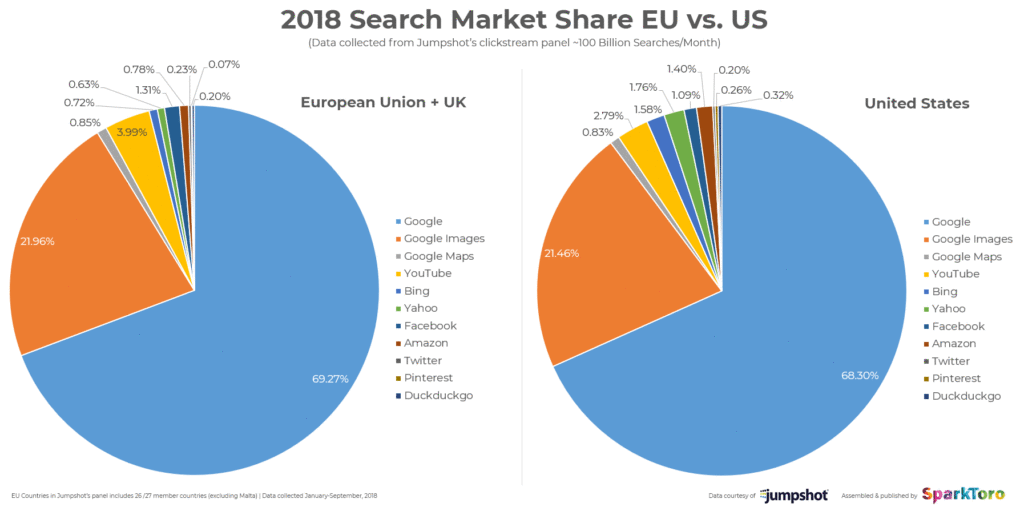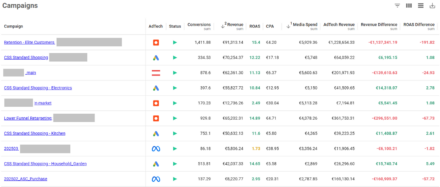Google’s European monopoly – and what it means for your organic search strategy

I recently read a blog post which, with its series of graphs, vividly shows how Google dominates the search market – to the extent that the post’s author Rand Fishkin concluded that, in Europe, nothing less than a monopolistic situation exists.
According to Jumpshot, combined Google properties account for 96.1% of all search in the EU; in the UK, 71% of searches are performed on Google with nearly 20% happening on Google images.

This situation has developed in an environment where there is a powerful European Commissioner for Competition (the current incumbent has been in post since 2014), and where Google has been on the receiving end of several regulatory judgements and fines.
So my reaction? Frankly, wow! For the record, as you can see, Google is hardly a long way behind itself in the USA, where it accounts for 93.4% of all US searches.
But what does it mean and what is the impact on anyone engaging in organic search here in Europe (and, well, in the US, really)? Three consequences stand out.
1. Optimise for Google. We are asked with surprising frequency why we advocate that search should be optimised for Google. Well, this is why! In more than one sense, search is a numbers game: it’s essential to optimise for the way the (overwhelming) majority of searches are conducted. Yes, I know this is obvious now.
2. Google optimisation will be a safe investment. Notwithstanding the ongoing potential for politics to play a part, Google’s dominance looks set to continue for the foreseeable future, ensuring any and all investment in optimising for Google is ‘protected’.
Why? It’s because, as Rand – now of Sparktoro – points out, it’s almost impossible for other search providers to become more competitive in the near term. Improving search quality depends on analysing and understanding searcher behaviour and improving results based on those searches. The more searches there are to analyse, the better the search provider is able to improve … it’s a circular system, and Google simply has too great a volume to be caught up anytime soon.
3. If something sounds too good to be true, that’s because it is. For all that it’s arguably advantageous not to have to make a decision over which algorithm to optimise for, there’s a fly in the ointment that we need to keep an eye on to ensure it doesn’t become an elephant in the room: click-through rates.
The stark figure is that organic click-through rates in the UK, the EU and the USA are all falling: between 2016 and 2018, organic CTRs in Europe + UK have declined by 18%, while 57% of mobile search now result in no click.
Why? Primarily because an increasing number of Google-owned properties such as feature snippets and knowledge panels provide the searcher with the answer sought, without the need to proceed further. As Rand Fishkin put it: “…while SEO and PPC remain powerful channels, the former (organic search) is being slowly cannibalized around the world, yielding more monetization and data-gathering value for Google and less for everyone else.”
At first sight that’s uncomfortable reading. Certainly it’s an early warning that more sophisticated approaches are needed for driving organic growth, since the incidence (and perhaps even the richness!) of rich results is only going to grow.Fortunately there are more sophisticated approaches to explore, including “on-SERP” and voice search strategies. And, of course, there are integrated, multi-channel approaches – at all of which we excel here at QueryClick.
I’ll be exploring the surprising scale of CTR decline from organic search in my next post; and, we’ll look not just at what is causing that decline, but what to do about it.
Stewart Donaldson
Client Strategy & Insights Manager, QueryClick
——
Rand Fishkin’s blog post referenced above can be found here; his data and the numbers re-used here came from Jumpshot.
Own your marketing data & simplify your tech stack.
Have you read?
Chrome’s announcement on dropping cookie opt-in last month closed the door on a 5 year saga for marketers. But what is the landscape like in 2025 for cookie-based measurement?
Generative AI is transforming the way that marketers plan and assemble content for their Paid Ads. As big platforms like Google, Meta and TikTok increasingly build the tools needed to...
In a surprising move that has sparked heated debate, Mark Zuckerberg announced on his Instagram that Meta will be reducing its levels of censorship and in particular fact-checking on its...


